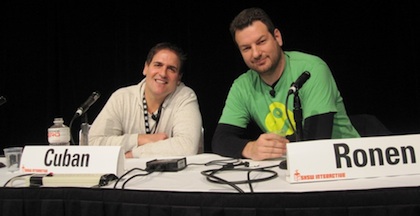
As a follow up to the failure of CableCARD and customer service post, I’m back in business. Cox Communications reps continued to reach out yesterday, but I was frustrated and beat down – and not interested in providing any more explanations of the issue or facilitating additional troubleshooting. So they went about resolving the situation on their end. Not sure what was done, but my entire channel lineup is now available on the TiVo Premiere (with it’s own set of issues that we’ll get to). Which dovetails nicely with the question of cutting the cord…
As attractive as it may seem to dump the cable co, it’s not really an option in our household. We enjoy our premium TV. And we enjoy the (usual) simplicity of our setup. There’s no question that over-the-top video is now everywhere. And expanding. Yet, the selection remains unpredictable. As does the quality of content and delivery. (Low-res Alf reruns on Hulu entertain for all of ten minutes. OK, maybe 20, Mr. Shumway.) However, there are options… for tech enthusiasts like us. But for most folks, beyond STBs with integrated Netflix or YouTube streaming, Internet-sourced content in a lean-back environment is a mystery.
At the recent SXSW Avner Ronen / Mark Cuban throwdown, Mark proclaimed that the future of TV is TV. Now I occasionally enjoy ribbing Cuban (sorry!) after events and statements like these, reminding him that he’s got a voice in this industry… because he made a boatload of cash from an Internet content distribution business back in the day. But, in the near term, he’s absolutely right. Distribution methods are evolving, perhaps the economics too, but we’re not going to see the revolution Boxee is probably banking on anytime soon. (Which is why I would so love it if they’d add an ATSC tuner and DVR capabilities to the upcoming Boxee Box.)

The only provider that could possibly and significantly move the needle in the next 18 months is ESPN. IF they chose to take their primary offering (not ESPN 360, err ESPN 3) to the cloud. But given their studio-ownership and lucrative distribution deals with the cable and satellite providers, why would they want to?
The good news for all of us is that there are those willing to cut the cable. And there are people who “watch TV” on a computer. It’s sort of a catch-22 at the moment, but this trend should speed deployment of alternate entertainment options. In turn, this would put pressure on the premium television providers to produce a compelling and competitive product. Maybe, just maybe, even leading to à la carte offerings. One can dream.
I also believe that competition will change TV, but I believe it’ll come between premium providers.
As for the Internet as a deliver method, since the same companies that provide premium provide internet it seems unlikely. I say this mostly because it seems hard to imagine a world where IP unicast is more economical than broadcast for delivering high quality video.
Yeah… and I didn’t even get into the whole cap issue.
My understanding is that ESPN earns the highest payout of all the cable channels, so I don’t see them ever leaving cable willingly. If you could get the channel without a bundled subscription people might be willing to pay them more directly, but too many people wouldn’t bother to make up the difference. As long as people are willing to pay their cable companies $50+ per month for television, no one is going to be in a hurry to change.
I’m in the same boat. I’m very tech savvy, typically an early adopter, and I love the idea of getting all my TV without the cable company. But the simple fact is that a large proportion of the programming we like to watch isn’t available (legally) online (and even if I wanted to take the bittorrent route, it’s much more of a pain in the ass to find things and get all the pieces). For those things I can get online, the quality is much lower and the convenience isn’t there. Given the choice between watching a show in real HD on our 52″ TV vs. in a little Hulu window with us huddled around a laptop, it’s a no-brainer. Sure, I could hook my laptop up to the TV, but then I can’t use it for other things at the same time, and the video quality isn’t there. And don’t even get me started on the simplicity thing. I’m sure it’s fun to tell house guests, “sure, you can watch TV! Just fire up bittorrent, find the show you want, but make sure it’s in the right format. Then wait an hour or two or maybe 10 for it to download. Then move the computer over to the TV and hook up these three cables. Open the file in VLC. Oh, it wants you to download a new version? Ignore that for now. Press play and make it full screen.”
As much as I have a distaste for the cable company, it’s by FAR the lesser of evils at this point. I’ll keep playing with the alternatives, and I’m sure they’ll be ready for prime time before too long, but I don’t think they’re even close yet for the average household. Geeks, have at it.
Sean I am a early cable cutter. Clearly there isn’t a out of the box solution, but a boxe box coupled with a well know bit torrent TV series client can get you everything you want. Wait hold the phone, XBMC is getting ready to support tuners (generalized and months away) well that only will help. For me the worst about cutting cable was missing sports, but with the cetron cable card or the HDHomerun CC tuner + Fios + XBMC, sounds like a TV viewers dream.
@JohnDean So it’s simply the user interface that led you to drop cable? A combination of Ceton and XBMC with CC support would bring you back?
Finally some numbers on this trend:
http://techcrunch.com/2010/04/13/800000-households-abandoned-tvs-web/
Though it now looks like the number was actually 600,000 in 2009, with 200,000 in 2008. So I guess the trend is accelerating.
I think the more obvious trend is that you can reduce your cable spend by supplementing cable with over-the-top offerings like Hulu, Apple TV, Amazon on Demand, etc. Why spend money on a channel like HBO or Showtime if you only watch a few movies per month on them? I’d much prefer to pay for movies when I watch them on my Apple TV. The fact that they restrict my ability to move the shows from one Tivo to another or put them on my iPod via the copy control flag makes them even less valuable to me. Plus of course I’m spending less time watching TV and more time on the web these days–there’s only so many hours in a day.
I cut the cable last year and don’t regret it. While ZNF readers are more tech savvy and likely to cut a cable early, non-ZNF readers are more likely to consume far less TV and more likely to be happy with OTA HD once they realize its there and free. The vast majority of non-tech people I interact with don’t even realize OTA HD exists and is free. All they need is a TiVo and an indoor intenna in many markets to get most of the TV they care about.
I don’t know how or wehen we’ll see the ESPN’s and CNNs of the world cut their exclusivity ties with big cable and offer their content over the Internet, but I know in my gutt that day is coming and probably sooner than most think.
…Dale